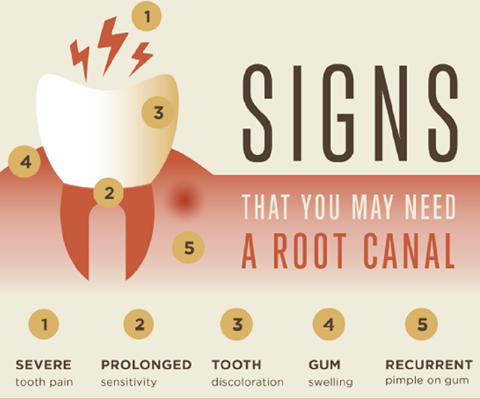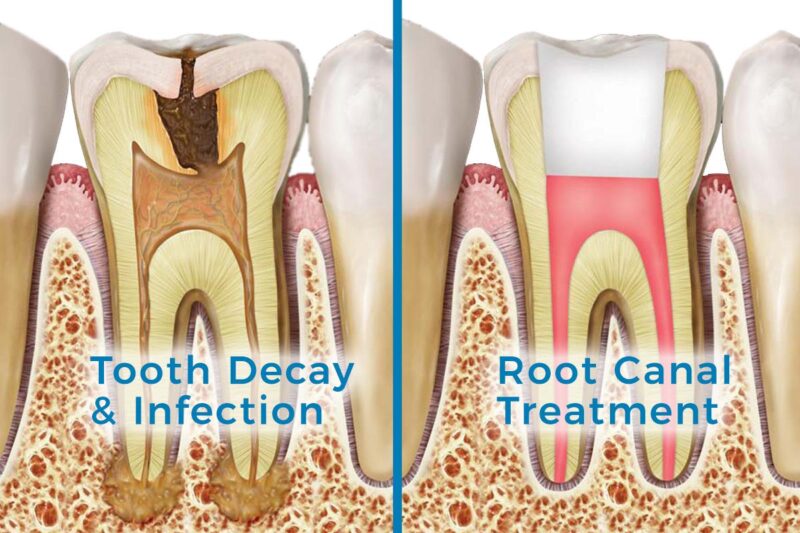One of the most commonly misunderstood treatments done in the dental office is a root canal. Although many people have heard of a root canal, few people can really describe what it is. And now with controversial media like the documentary Root Cause, people may be even more apprehensive about this procedure that already had a reputation for being uncomfortable. (Root Cause was recently removed from Netflix due to a lack of evidence for it’s outlandish claims about root canals – Read more here)

At any point in this process, a root canal can be initiated. The unfortunate truth is that if the nerve is affected in this way, the progression to the dead tooth and infection is irreversible. Many people ask if a root canal is worth it, or if it is better to just pull the tooth out. Dr. Seminara would say that in more cases preserving your own natural tooth has many benefits over removing it, even if we can replace teeth very predictably nowadays. Of coure we recognize that sometimes there is no choice but to go for the extraction, particularly if the tooth is critically broken or decayed. But Dr. Seminara’s first priority is to try and save your tooth.
So What is a Root Canal?
Simply put, a root canal is performed to treat an infection of the nerves and tissues at the centre of the tooth.
Before starting, the patient will be completely numbed with local anesthetic to ensure that they remain comfortable throughout the procedure. A rubber dam is always used during a root canal to ensure that the tooth remains a clean and dry and possible. When the tooth is numb, a hole is made in the tooth to access the nerve. Through this hole, all the tissues that have become damaged and inflamed by infection will be cleaned out using small tooth files and a disinfectant solution. Finally once the cleaning is done, a rubber material called gutta percha is used to fill in the roots of the tooth. This is to seal the tooth and prevent reinfection.

In most cases, Dr. Seminara will complete treatment by placing a dental crown over the tooth. The purpose of the crown is to reinforce the tooth to keep it from breaking, and to prevent re-infection of the roots. A tooth that has been treated with a root canal and a crown can function in the mouth for many years to come.
Benefits of Root Canal Therapy
Of course there is a lot of misinformation about root canals, and a lot of patients have heard scary stories about them. But when done by an experienced dentist, the procedure can be painless and relatively straightforward, and serve to keep you from losing a tooth.
Here are some of the greatest benefits of root canal therapy:
- It is less costly than a tooth extraction and subsequent implant or bridge to replace the missing tooth
- Because it involves the placement of a dental crown, it can actually improve the appearance of the affected tooth (which often is broken or heavily restored)
- Root canal therapy efficiently restores the strength and function of an infected tooth
When to Consider Tooth Extraction
In some cases, the damage to the tooth may be too severe for a root canal to save the tooth. If the tooth is fractured into the roots, or if the decay is so large that it goes under your gums and into the root area, then tooth extraction may be necessary.
Although our goal at Downtown Montreal Dentistry is the always try and save teeth, tooth extraction may be the solution if your tooth is just too far gone to save. If Dr. Seminara does suggest tooth extraction, it recommended to follow up the procedure with a treatment that replaces the missing tooth. If not, the entire strength and structure of the smile could be compromised.
Contact Us
Root canal infection can be painful, compromises the health of your mouth, and if left untreated may lead to the loss of teeth. If you would like to learn more about your options for treating a root canal infection, contact us to get an appointment at our downtown dental clinic to see Dr. Seminara.



When you feel severe pain or cavity in your tooth, you just need to visit your dentist without considering anything like you need to take root canal treatment or extraction treatment. It completely depends on the condition of your damaged or decayed tooth. Most of the patients are scared because of unsuccessful root canal treatment and prefer to extract the tooth. But there is nothing to worry about. If your treatment is done by an experienced dentist they will do the treatment properly without harming your teeth and will not leave you in severe pain. Also, they prefer to save your natural teeth because extraction is only preferred when the teeth are completely decayed.
Thanks for the great comment Marilyn!